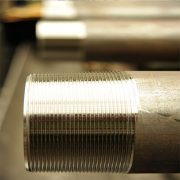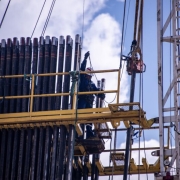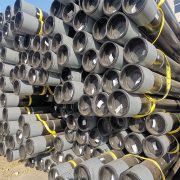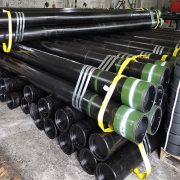Plášťová trubka API 5CT pro vrtání
Při průzkumu ropy a zemního plynu je zajištění strukturální integrity vrtu jedním z nejdůležitějších úkolů. Plášťové trubky API 5CT hrají v tomto procesu ústřední roli, poskytují strukturální podporu a zabraňují zhroucení vrtu, izolují různé vrstvy podzemních útvarů a chrání vrt před vnější kontaminací. Tyto trubky jsou navrženy a vyrobeny tak, aby splňovaly přísné požadavky na vrtání, kde jsou běžná drsná prostředí a extrémní tlaky.
Tento blogový příspěvek poskytuje komplexního průvodce opláštěním trubek API 5CT, který zahrnuje jejich design, výhody, aplikace, třídy a klíčové úvahy pro výběr správné pažnicové trubky pro vrtání. Bude to zvláště cenné pro odborníky na těžbu ropy a zemního plynu, kteří chtějí porozumět roli plášťových trubek v integritě a výkonu vrtu.
Co je to API 5CT Casing Pipe?
API 5CT je specifikace vytvořená společností American Petroleum Institute (API) který definuje standard pro pouzdra a trubky používané v ropných a plynových vrtech. Pažnicové trubky API 5CT jsou ocelové trubky uložené do vrtu při vrtání. Slouží několika základním účelům, včetně:
- Podpora vrtu: Plášťové trubky zabraňují zhroucení vrtu, zejména v měkkých formacích nebo vysokotlakých zónách.
- Izolace různých geologických vrstev: Tyto trubky utěsňují studnu před formacemi obsahujícími vodu a zabraňují kontaminaci sladkovodních vodonosných vrstev.
- Ochrana studny před vnějším tlakem: Pažnicové trubky chrání vrt před extrémními tlaky při vrtání, výrobě a vstřikování.
- Poskytování cesty pro výrobu trubek: Po vyvrtání vrtu slouží pažnicové trubky jako vodítko pro výrobní potrubí, které se používá k těžbě ropy a plynu z ložiska.
Specifikace API 5CT definuje různé třídy, vlastnosti materiálů, zkušební metody a rozměry, aby bylo zajištěno, že pažnicové trubky splňují náročné požadavky na vrtání.
Klíčové vlastnosti a výhody plášťových trubek API 5CT
1. Vysoká pevnost a odolnost
Plášťové trubky API 5CT jsou vyrobeny z vysoce pevných ocelových slitin navržených tak, aby vydržely extrémní tlaky a náročné podmínky ve spádu. Tato pevnost zajišťuje, že trubky zvládnou hmotnost překrývajících se útvarů při zachování celistvosti.
2. Odolnost proti korozi
Plášťové trubky jsou často vystaveny korozivním kapalinám, jako jsou vrtné kaly, formovací vody a uhlovodíky. Pro ochranu potrubí před korozí se mnoho druhů pláště API 5CT vyrábí s korozivzdornými povlaky nebo materiály, jako je např. H2S odolný oceli pro vrty kyselého plynu. Tato odolnost pomáhá prodloužit životnost vrtu a snižuje riziko selhání pláště v důsledku koroze.
3. Všestrannost v různých podmínkách studny
Plášťové trubky API 5CT se dodávají v různých jakostech a tloušťkách, díky čemuž jsou vhodné pro různé hloubky studní, tlaky a podmínky prostředí. Ať už jde o mělký zemní vrt nebo hluboký vrt na moři, existuje plášťová trubka API 5CT navržená tak, aby zvládla specifické výzvy aplikace.
4. Zvýšená bezpečnost a integrita studny
Plášťové trubky hrají zásadní roli při zajišťování integrity vrtu tím, že poskytují bezpečnou bariéru mezi vrtem a okolními formacemi. Správně nainstalované pouzdro pomáhá předcházet výbuchům, zhroucení vrtu a kontaminaci kapalin, což zajišťuje bezpečnost vrtného personálu a životního prostředí.
5. Splnění přísných průmyslových standardů
Specifikace API 5CT zajišťuje, že plášťové trubky splňují přísné průmyslové normy pro mechanické vlastnosti, chemické složení a rozměrové tolerance. Tyto trubky procházejí přísným testováním, včetně tahových zkoušek, hydrostatických tlakových zkoušek a nedestruktivního hodnocení, aby bylo zajištěno, že splňují vysoké standardy požadované pro těžbu ropy a zemního plynu.
Třídy API 5CT a jejich aplikace
Specifikace API 5CT zahrnuje několik druhů pažnicových trubek, z nichž každá je navržena pro různá vrtná prostředí a podmínky vrtů. Některé z nejčastěji používaných tříd zahrnují:
1. J55
- aplikace: Pažnicové trubky J55 se běžně používají v mělkých vrtech, kde jsou tlaky a teploty relativně nízké. Často se používají v ropných, plynových a vodních vrtech.
- Klíčové vlastnosti: J55 je nákladově efektivní a poskytuje dostatečnou pevnost pro mělké aplikace. Není však vhodný do vysoce korozivního prostředí nebo hlubších vrtů s vysokým tlakem.
2. K55
- aplikace: K55 je podobný J55, ale s mírně vyšší pevností, takže je vhodný pro podobné aplikace, ale nabízí lepší výkon při vyšších tlacích.
- Klíčové vlastnosti: Tato třída se často používá ve vrtech s mírnou hloubkou a tlakem, zejména při vrtání na pevnině.
3. N80
- aplikace: Pažnicové trubky N80 se používají v hlubších vrtech se středními až vysokými tlaky a teplotami. Běžně se používají v ropných a plynových vrtech, které vyžadují zvýšenou pevnost.
- Klíčové vlastnosti: N80 poskytuje vynikající pevnost v tahu a je odolnější proti zborcení než nižší třídy, takže je ideální pro náročnější podmínky vrtání.
4. L80
- aplikace: L80 je kyselý provozní stupeň používaný ve vrtech, které produkují sirovodík (H2S), korozivní a toxický plyn. Tato třída je navržena tak, aby odolala prostředí kyselých plynů, aniž by trpěla praskáním sulfidovým napětím.
- Klíčové vlastnosti: L80 je odolný proti korozi a má vysokou mez kluzu, takže je vhodný pro hluboké vrty a prostředí s kyselým plynem.
5. P110
- aplikace: Pažnicové trubky P110 se používají v hlubokých vysokotlakých vrtech, kde je pevnost rozhodující. Tato třída se často používá v pobřežních a hlubokých pobřežních vrtech.
- Klíčové vlastnosti: P110 poskytuje vysokou pevnost v tahu a odolnost vůči prostředí s vysokým tlakem, takže je vhodný pro extrémní podmínky vrtání.
Každá třída má specifické vlastnosti navržené tak, aby vyhovovaly jedinečným výzvám různých podmínek vrtu. Výběr správné třídy je zásadní pro zajištění integrity a provozního úspěchu.
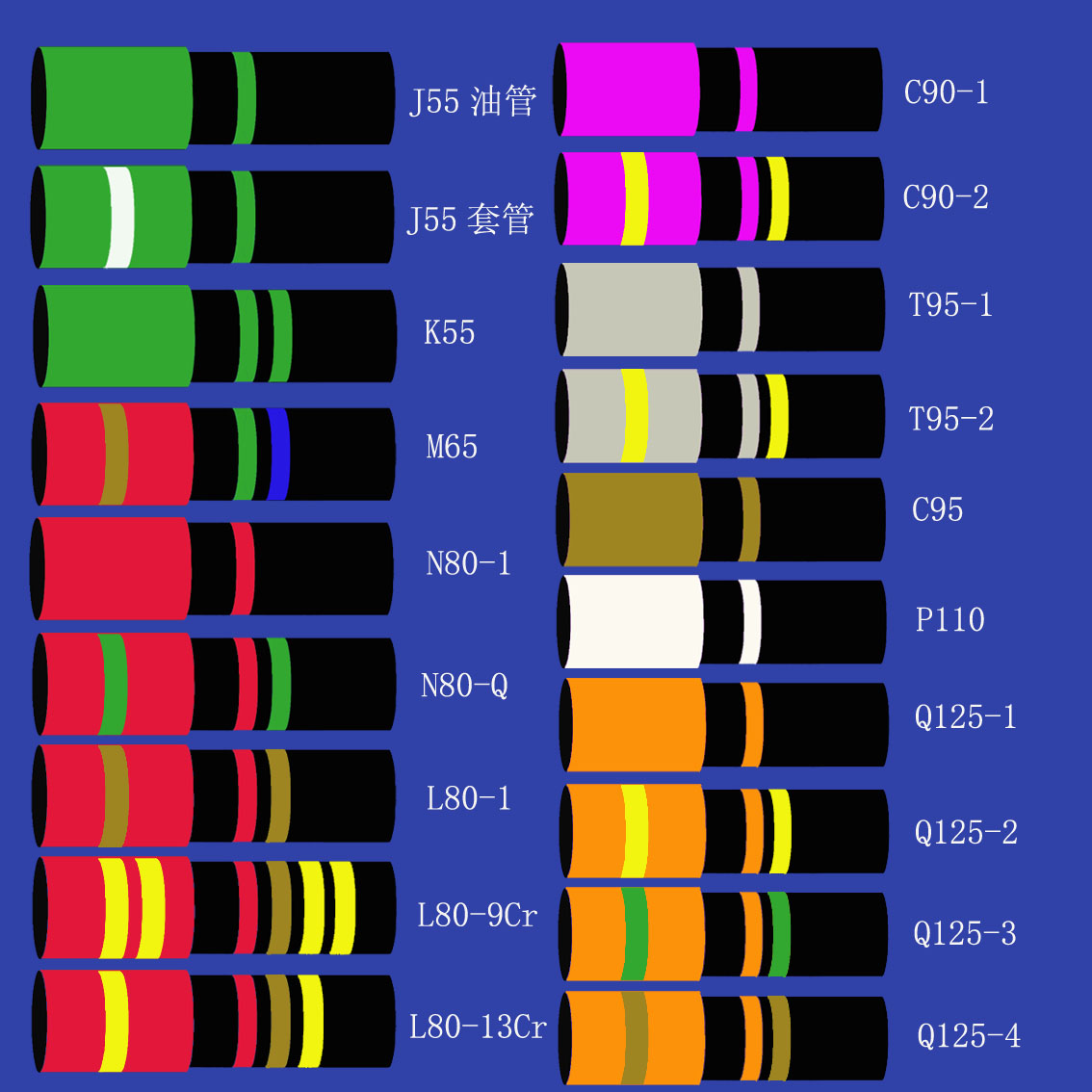
Klíčové úvahy při výběru plášťových trubek API 5CT
1. Hloubka a tlak studny
Jedním z nejkritičtějších faktorů při výběru pažnicové trubky je hloubka studny a tlaky v této hloubce. Hlubší vrty vyžadují materiály pažnice s vyšší pevností, jako např N80 nebo P110, aby vydržely zvýšený tlak a váhu nadložních útvarů.
2. Korozní potenciál
Pokud se očekává, že vrt bude produkovat kyselý plyn nebo jiné korozivní kapaliny, je nezbytné vybrat typ trubky pažnice, který je odolný vůči sirovodíku (H2S) a dalším korozivním prvkům. L80 se běžně používá pro kyselé plynové vrty, zatímco J55 a K55 jsou vhodné pro studny s nižším korozním rizikem.
3. Teplota a podmínky prostředí
Vrty vrtané v prostředí s vysokou teplotou, jako jsou geotermální vrty nebo hluboké ropné a plynové vrty, vyžadují pažnicové trubky, které vydrží extrémní teplo. Vysoce pevné třídy jako P110 se v těchto situacích často používají k zajištění odolnosti proti tepelné roztažnosti a únavě materiálu.
4. Cena a dostupnost
Výběr plášťových trubek také závisí na nákladech. Nižší ročníky jako J55 a K55 jsou cenově výhodnější a vhodné pro mělké studny, zatímco vyšší třídy mají rády P110 jsou dražší, ale nezbytné pro hlubší vysokotlaké vrty. Při výběru plášťové trubky je rozhodující vyvážení nákladů a výkonu.
5. Společné spoje
Plášťové trubky API 5CT lze osadit různými typy závitových spojů, jako jsou např Buttress Threaded and Coupled (BTC) a Prémiová vlákna. Volba připojení závisí na konkrétním provedení studny a provozních požadavcích. Ve vrtech s vysokým kroutícím momentem nebo ohybovým zatížením jsou často vyžadovány vysoce výkonné spoje.
Role pláště API 5CT při vrtacích operacích
1. Povrchové pouzdro
Povrchová pažnice je první pažnicovou strunou nastavenou ve vrtu po zahájení vrtání. Jeho primárním účelem je chránit sladkovodní vodonosné vrstvy před kontaminací tím, že je izoluje od vrtu. J55 a K55 se běžně používají pro povrchové bednění v mělkých vrtech.
2. Mezilehlé pouzdro
Mezilehlý plášť se používá ve vrtech s hlubšími formacemi, aby poskytoval další podporu a ochranu. Tento obalový řetězec izoluje problémové oblasti, jako jsou oblasti s vysokým tlakem plynu nebo nestabilní útvary. N80 nebo L80 jakosti lze použít pro mezipaždění ve vrtech s vyšším tlakem a korozními podmínkami.
3. Výrobní pouzdro
Výrobní pažnice je konečná pažnicová struna zasazená do vrtu a právě přes toto pažnice se produkují uhlovodíky. Výrobní obal musí být dostatečně pevný, aby odolal tlaku a mechanickému namáhání během výroby. P110 se běžně používá v hlubokých, vysokotlakých vrtech pro výrobu pažnice.
Testování a kontrola kvality plášťových trubek API 5CT
Aby byla zajištěna integrita a spolehlivost plášťových trubek API 5CT, výrobci podrobují trubky přísným opatřením kontroly kvality a testování. Patří sem:
- Testování tahem: Ověření schopnosti trubky odolat axiálním silám bez poruchy.
- Testování hydrostatickým tlakem: Zajištění, že trubka odolá vnitřním tlakům, ke kterým dochází během vrtání a výroby.
- Nedestruktivní testování (NDT): Metody jako ultrazvukové nebo magnetické zkoušení částic se používají k detekci jakýchkoliv kazů, prasklin nebo defektů v materiálu potrubí.
Tyto testy pomáhají zajistit, že pažnicové trubky API 5CT splňují mechanické a chemické vlastnosti požadované normou API a náročné podmínky vrtných operací.
Závěr
Plášťové trubky API 5CT jsou klíčovou součástí procesu těžby ropy a zemního plynu, poskytují strukturální integritu potřebnou k udržení stabilního, bezpečného a funkčního vrtu. Jejich síla, odolnost proti korozi a všestrannost je činí nepostradatelnými pro různá prostředí vrtů, od mělkých pozemních vrtů až po hlubinné operace na moři.
Výběrem vhodné třídy a typu pažnicové trubky API 5CT na základě podmínek vrtu mohou profesionálové v ropném a plynárenském průmyslu zajistit bezpečný, efektivní a dlouhodobý provoz vrtu. Správný výběr, instalace a údržba pažnicových trubek jsou nezbytné pro zamezení nákladným poruchám, ochranu životního prostředí a maximalizaci produktivity vrtu.

